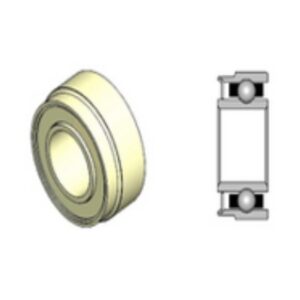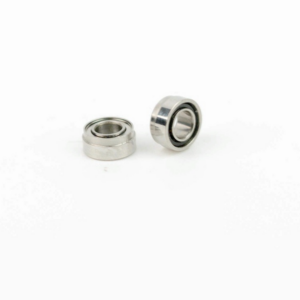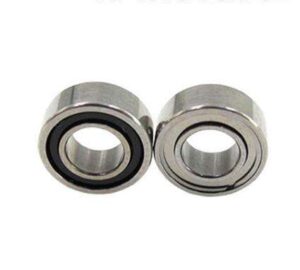Bearings play a crucial role in countless machines, from everyday tools to complex machinery. These mechanical components minimize friction between moving parts, enabling smooth motion and extending the lifespan of devices. If you’ve ever wondered how a machine moves so seamlessly, it’s likely because of a carefully selected ball bearing, roller bearing, or other bearing type. In this article, we’ll explore the purpose, types, and practical uses of bearings and reveal why choosing the right bearing is vital to the operation of any machine.
What Is a Bearing, and Why Is It Important?
A bearing is a component designed to support and guide a rotating shaft or moving part while minimizing friction between surfaces. Bearings are essential for maintaining the efficiency of various machines, from cars to dental equipment. Without them, machines would suffer wear and tear due to excessive friction, leading to frequent breakdowns and higher maintenance costs.
Bearings ensure smooth, controlled movements, helping machines achieve optimal performance while extending their operational lifespan. Whether in a small home appliance or industrial machinery, bearings are vital for smooth and reliable operation.
How Do Bearings Reduce Friction in Machines?
One of the key purposes of bearings is to reduce friction between two moving surfaces. Friction generates heat and energy loss, which can damage machinery over time. Bearings create a small rolling contact area, making it easier for parts to move freely with minimal resistance.
By using roller bearings or ball bearings, friction is distributed along the rolling elements, reducing wear on both the bearing and the machine. This process saves energy and extends the working life of the device.
What Are the Main Types of Bearings?
There are several types of bearings used in machinery, each designed for specific functions and applications:
- Ball Bearings: Ideal for handling light loads and high speeds.
- Roller Bearings: Designed for applications requiring support for heavier loads.
- Spherical Roller Bearings: Suitable for misaligned shafts in industrial applications.
- Wheel Bearings: Used in vehicles to ensure smooth wheel rotation.
Understanding these types helps in selecting the most appropriate bearing for different tasks.
How Do Ball Bearings Work?
Ball bearings are one of the most commonly used bearing types. These bearings consist of small steel balls that rotate between two smooth metal rings, minimizing friction by rolling instead of sliding.
Ball bearings are used in a wide range of applications, including bicycles, dental tools, and home appliances, thanks to their ability to handle both radial and axial loads efficiently. They provide smooth motion, making machines operate quietly and precisely.
When Should You Use Roller Bearings?
Roller bearings feature cylindrical rolling elements and can support higher radial loads compared to ball bearings. These bearings are used in industries like construction and automotive manufacturing, where heavy loads are common.
Due to their shape, roller bearings offer greater surface contact and are ideal for applications with constant heavy pressure. Choosing the right bearing type ensures that machinery performs smoothly under stress without compromising durability.
How Bearings Improve Performance and Efficiency
By minimizing friction, bearings contribute to enhanced machine performance. Whether you’re dealing with high-speed tools or industrial motors, bearings help reduce noise, increase precision, and prevent energy loss.
Bearings also reduce the need for frequent maintenance, resulting in cost savings over time. Selecting the right bearing type ensures machines operate efficiently, even under demanding conditions.
What Are the Differences Between Roller and Ball Bearings?
While both roller and ball bearings reduce friction, their applications differ based on load types. Ball bearings are better for high-speed applications but handle lighter loads, while roller bearings are designed for heavy-duty operations.
Understanding these differences helps in making informed decisions about which type of bearing to use in specific situations.
How to Select the Right Bearing Type for Your Needs
Choosing the right bearing type depends on several factors, such as load, speed, and the environment in which the bearing will operate. For high-speed applications with light loads, ball bearings are an excellent choice. For heavy-duty machinery, roller bearings offer superior support.
Working with an experienced supplier can help identify the best solution for your machinery, whether it’s for a vehicle, industrial equipment, or precision tools.
Where Are Wheel Bearings Commonly Used?
Wheel bearings are essential components in vehicles, allowing wheels to rotate smoothly with minimal friction. These bearings support the weight of the vehicle and ensure the wheels spin freely without creating excessive noise or heat.
Regular maintenance of wheel bearings ensures vehicle safety and optimal performance. Faulty or worn-out bearings can lead to wheel wobbling, uneven tire wear, and unsafe driving conditions.
What Is the Purpose of Spherical Roller Bearings?
Spherical roller bearings are used when there’s a need to compensate for shaft misalignment. These bearings can tolerate more alignment errors than other types, making them ideal for industrial applications such as conveyor systems and heavy machinery.
Their robust design and ability to handle radial and axial loads make them versatile and highly reliable in demanding environments.
Summary: Key Takeaways on Bearing Types and Uses
- Bearings reduce friction between moving parts, enhancing machine performance and lifespan.
- Ball bearings handle light loads and high speeds, while roller bearings support heavier loads.
- Spherical roller bearings are ideal for applications requiring alignment compensation.
- Wheel bearings ensure smooth wheel rotation in vehicles, contributing to safety and efficiency.
- Choosing the right bearing for a given application ensures optimal performance and cost savings.










